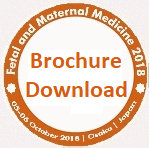Julie Sartori
Edith Cowan University, Australia
Title: The importance of implantation and placentation for successful pregnancy
Biography
Biography: Julie Sartori
Abstract
The quest to understand human conception and subsequent gestational development has evolved significantly over the past 2000 years. This collective knowledge has now culminated in the reproductive revolution of the 21st century and is crucial to human reproductive development. Current research examining pre and post conception mechanisms, have allowed greater insight into the physiological cascade of events that result in successful pregnancy. These studies also highlight the impact of control mechanisms such as cytoplasmic inheritance and epigenetic regulation on birth outcomes. Human pregnancy is considered viable after three essential processes have occurred, fertilization, implantation and placentation. Preparation for fertilization involves a complex interplay between the maternal pituitary, ovarian and uterine axis. Implantation and placentation results from a complex cascade of events that are orchestrated by fetal, maternal and paternal biochemical signaling. Approximately 75% of unsuccessful pregnancies are lost during the early stages of conceptual development. This is primarily due to inability of the conceptus to attach and implant within the endometrial lining or erroneous modifications during normal trophoblastic differentiation. As part of the placenta project pregnant women from Perth, Western Australia, were recruited from private and public hospitals, with pregnancies resulting from both natural and assisted conceptions. Data will be presented from 630 participants, collected from Maternal Health Questionnaires, gross placental examination and maternal - neonatal medical records. A preliminary examination of current research data has resulted in new information that supports existing reproductive theories and encourages further examination of placental tissue. Using a conceptual approach, maternal factors will be used to highlight the importance of early reproductive mechanisms and the role of the placenta in successful pregnancy, prenatal development and potential long-term health outcome.

